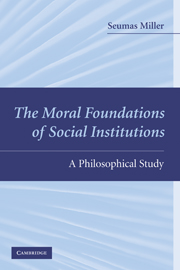11 - Institutions and Information and Communication Technology
Published online by Cambridge University Press: 05 June 2012
Summary
Technical developments in information and communication technology in conjunction with the twin processes of globalization and the deregulation of markets have in recent times led to the establishment of what might be regarded as a relatively new form of social institution, namely, one that is both trans-societal and technology-centered. The Internet is perhaps the most obvious candidate. I doubt that such socio-technical systems ought to be regarded as social institutions per se. Rather, I view them as akin to rail and other transport systems, that is, complex technical systems that serve human collective ends, but that are not in themselves constituted by human action (as is necessarily the case with social institutions). On the other hand, such technical systems are clearly in part constitutive of some social institutions, such as a university's intranet, and in the case of information and communication technology, this appears to be increasingly so (Friedman 2007).
In this chapter I undertake two main tasks. First, I apply my collective end theory (Miller 2001b, chaps. 2 and 5) of joint action and my individualist, teleological account of social institutions, and their associated technical notions of joint procedures, joint mechanisms, and collective ends, to the institutional processes of the acquisition of certain forms of social knowledge. The focus here is on analyzing the communication, storage, and retrieval of knowledge by means of information and communications technology (ICT) in terms of the teleological model and, more specifically, the collective end theory.
- Type
- Chapter
- Information
- The Moral Foundations of Social InstitutionsA Philosophical Study, pp. 300 - 320Publisher: Cambridge University PressPrint publication year: 2009



